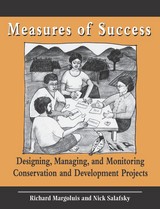

In Measures of Possibility, Domhnall Mitchell sets out to test the hypothesis of Dickinson's textual radicalism, and its consequences for readers, students, and teachers, by looking closely at features such as spacing, the physical direction of the writing, and letter-shapes in handwritten lyric and epistolary texts. Through systematic contextualization and cross-referencing, Mitchell provides the reader with a critical apparatus by which to measure the extent to which contemporary approaches to Dickinson's autograph procedures can reasonably be formulated as corresponding to the poet's own purposes.

Measures of Success is a practical, hands-on guide to designing, managing, and measuring the impacts of community-oriented conservation and development projects. It presents a simple, clear, logical, and yet comprehensive approach to developing and implementing effective programs, and can help conservation and development practitioners use principles of adaptive management to test assumptions about their projects and learn from the results.
The book presents a systematic approach to improving the focus, effectiveness, and efficiency of projects, with specific guidelines and advice on:
- designing a realistic conceptual framework based on local site conditions
- developing clearly defined goals, objectives, and activities
- creating a monitoring plan that can be used to assess whether goals and objectives are being met
- integrating social and biological science techniques to collect the most relevant and useful data in the most cost-effective way
- using the information obtained through the monitoring plan to modify the project and learn from the result
The text is developed in eight chapters that follow the structure of a planning process from conception to completion, with the chapters linked by four scenarios that serve as teaching case studies throughout the book. Examples from these scenarios illustrate the processes and tools discussed, and each scenario case study is presented in its entirety in an appendix to the volume. The approach has been developed and field tested by practitioners working in many different projects in Latin America, Africa, and Asia, and their experience and input ensure that the guide is both practical and useful.
Measures of Success is the only work of its kind currently available, and represents an invaluable resource for field-based practitioners, project managers, and local community leaders, as well as for international NGO staff, college and university teachers and students, researchers, and government officials.
READERS
Browse our collection.
PUBLISHERS
See BiblioVault's publisher services.
STUDENT SERVICES
Files for college accessibility offices.
UChicago Accessibility Resources
home | accessibility | search | about | contact us
BiblioVault ® 2001 - 2024
The University of Chicago Press









